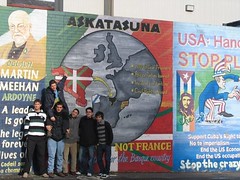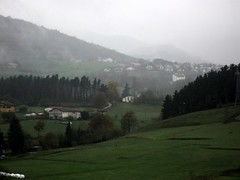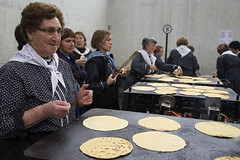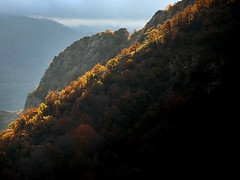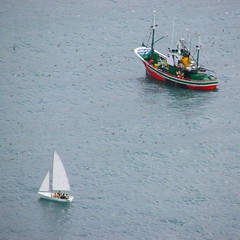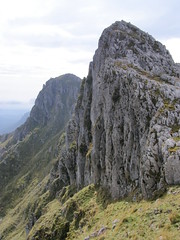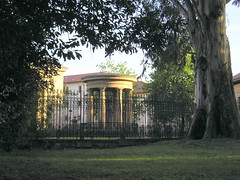Via The Guardian we get this article that speaks out against the campaign of lies and deception set in place by Madrid against the Basque people, an slander campaign that easily finds echoes in the international media. Here you have it:
Things could be different if the Spaniards (and the French for that case) were able to let go of the pride the get from their colonialist (and genocidal) past.
Kudos to Mr. Ó Muilleoir for his commitment with peace, justice and truth. I have added a link to his blog entitled "From the Balcony, A Publisher's Blog".
Europe's last conflict
Recent events point towards a gloomy prognosis for the Basque-Spanish conflict
Máirtín Ó Muilleoir
guardian.co.uk, Saturday November 29 2008 14.00 GMT
In the mountain village of Lizartza – population 500 – in the Basque country, they have a stellar reputation for rolling out the red carpet for visitors. So why has the arrival of a new blow-in village mayor sparked angry protests?
Because in the most recent local government poll, the sitting council members were all banned from standing for election due to their association with the Basque independence party Batasuna. That left the way clear for a representative of the conservative Partido Popular to sweep the boards and, with almost fewer votes than fingers, become village mayor.
Visits by the mayor, whose major contribution to civic life is to provocatively raise the Spanish flag over the fiercely Basque hamlet, prompt the full deployment of the riot police.
So far, one local pensioner has received a four-year sentence for allegedly hitting the mayor in the eye with a Basque flag during demonstrations by furious villagers.
It's against this surreal background – of banned political parties, aborted political processes, and prison sentences for voicing points of view – that coverage of the attempted extradition of former Eta leader Iñaki de Juana Chaos from Belfast to Madrid must be assessed.
The Guardian reports that de Juana Chaos handed over a letter to Basque protesters urging the continuation of the Eta armed campaign (a bloody and counterproductive campaign which this writer condemns unreservedly).
In fact, the former Eta prisoner denies providing any such letter. It's even more bizarre: the alleged call to arms in the "letter" is the statement, "keep the ball going forward".
Post 9/11, the Spanish government got away with disgraceful activities in the name of the "war on terror". That included the shuttering of the Basque daily newspaper Egunkaria and the torture of its directors.
Almost six years later, asinine accusations that the newspaper – the only one banned by a western democracy in recent times – was sending secret messages to Eta have yet to reach a court of law.
The UN special rapporteur on torture has found clear evidence of the torture of the Egunkaria staffers, including Martxelo Otamendi, now editor of the replacement Basque daily Berria, who I interviewed on video for my blog last week – after the judges in Madrid had returned him his passport, seized in 2003, so that he could travel to our annual awards evening.
Last year, the priest credited with brokering the Irish peace process, Father Alex Reid, returned from the Basque country because in his view, the Spanish government had no interest in building a peace process.
Recent events would seem to confirm his gloomy prognosis for the Basque-Spanish conflict. However, having sipped the sweet patxarana liquor in the clubhouse of the Lizartza gastronomical society and raised a glass to the generosity of the Basques, I refuse to believe that Europe's last battlefield must be condemned to another generation of warfare.
Things could be different if the Spaniards (and the French for that case) were able to let go of the pride the get from their colonialist (and genocidal) past.
Kudos to Mr. Ó Muilleoir for his commitment with peace, justice and truth. I have added a link to his blog entitled "From the Balcony, A Publisher's Blog".
.... ... .
